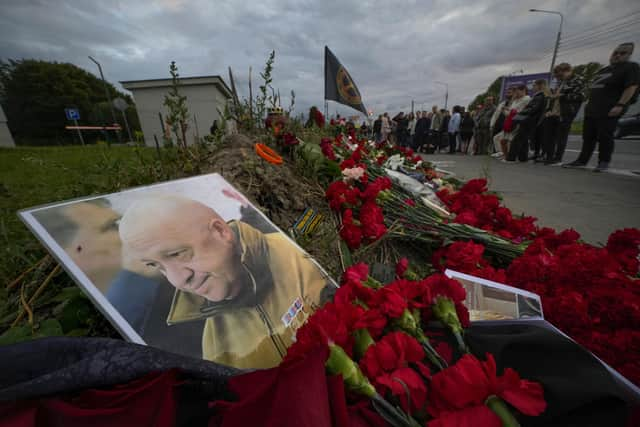Wagner Group boss Yevgeny Prigozhin officially confirmed dead in wake of Russia plane crash after genetic analysis of bodies
Russia’s investigative committee has said it has confirmed that Yevgeny Prigozhin, founder of the mercenary group Wagner, was killed in a plane crash.
Committee spokeswoman Svetlana Petrenko said in a statement that forensic testing identified all ten bodies recovered at the site of Wednesday’s crash and the findings “conform to the manifest” of the plane. The statement did not offer any details as to what might have caused the crash.
Advertisement
Hide AdAdvertisement
Hide AdRussia’s civil aviation authority earlier this week said Mr Prigozhin, 62, and some of his top lieutenants were on the list of the passengers and crew members on board the plane.


All seven passengers and three crew died when the plane plummeted from the sky halfway between Moscow and St Petersburg, Mr Prigozhin’s home town.
Two months ago, Mr Prigozhin mounted a day-long mutiny against Russia’s military, leading his mercenaries from Ukraine towards Moscow. President Vladimir Putin decried the act as “treason” and vowed punishment for those involved.
Instead, the Kremlin quickly cut a deal with Mr Prigozhin to end the armed revolt, saying he would be allowed to walk free without facing any charges and to resettle in Belarus. Questions have remained, however, about whether Mr Prigozhin eventually would face a comeuppance for the brief uprising that posed the biggest challenge to Mr Putin’s authority of his 23-year rule.
A preliminary US intelligence assessment concluded an intentional explosion caused the plane to go down. As suspicions grew the Russian president was the architect of an assassination, the Kremlin rejected them as a “complete lie”.
One of the Western officials who described the initial assessment said it determined Mr Prigozhin was “very likely” targeted and that an explosion would be in line with Mr Putin’s “long history of trying to silence his critics”.
Mr Prigozhin’s second-in-command Dmitry Utkin, as well as Wagner logistics mastermind Valery Chekalov, were also killed in the crash. Mr Utkin was long believed to have founded Wagner and baptised the group with his nom de guerre.
The fate of Wagner, which until recently played a prominent role in Russia’s military campaign in Ukraine and was involved in a number of African and Middle Eastern countries, has remained uncertain.
Advertisement
Hide AdAdvertisement
Hide AdAfter the mutiny, the Kremlin said Mr Prigozhin would be exiled in Belarus, and his fighters were offered three options: to follow him there, retire or enlist in Russia’s regular army and return to Ukraine, where Wagner mercenaries had fought alongside Russian troops.
Several thousand Wagner mercenaries opted to move to Belarus, where a camp was erected for them south-east of the capital, Minsk.
The Wagner chief’s death was confirmed as Ukrainian authorities launched an investigation after a mid-air collision between two warplanes in the west of the country killed three pilots.
Air force spokesman Yuri Ihnat said it was not immediately clear how long the inquiry would take. According to the air force’s Telegram page, two L-39 training military aircraft collided during a combat mission over Ukraine’s western Zhytomyr region on Friday.
Three pilots were killed, including Andriy Pilshchykov, a well-known pilot with the nickname “Juice” who was an outspoken advocate for Ukraine getting F-16 fighter jets.
Comments
Want to join the conversation? Please or to comment on this article.